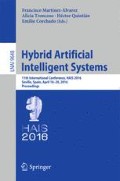Abstract
In deliberative consultations, which utilise electronic surveys as a tool to obtain information from residents, preserving privacy plays an important role. In this paper investigation of a possibility of privacy preserving data mining techniques application in deliberative consultations has been conducted. Three main privacy preserving techniques; namely, heuristic-based, reconstruction-based, and cryptography-based have been analysed and a setup for online surveys performed within deliberative consultations has been proposed.
This work can be useful for designers and administrators in the assessment of the privacy risks they face with a system for deliberative consultations. It can also be used in the process of privacy preserving incorporation in such a system in order to help minimise privacy risks to users.
This work has been supported by the National Centre for Research and Development under Grant No. IS-1/072/NCBR/2014 and the Institute of Computer Science, Warsaw University of Technology under Grant No. II/2015/DS/1.
Access this chapter
Tax calculation will be finalised at checkout
Purchases are for personal use only
Notes
- 1.
The proof in the case of privacy preserving association rules mining can be found in [16].
References
Albrecht, S.: E-consultations: a review of current practice and a proposal for opening up the process. In: Tambouris, E., Macintosh, A., Sæbø, Ø. (eds.) ePart 2012. LNCS, vol. 7444, pp. 13–24. Springer, Heidelberg (2012)
Li, X., Yan, Z., Zhang, P.: A review on privacy-preserving data mining. In: 14th IEEE International Conference on Computer and Information Technology, CIT 2014, Xi’an, China, 11–13 September 2014, pp. 769–774. IEEE (2014)
Aggarwal, C.C.: Data Mining - The Textbook. Springer, Switzerland (2015)
Huai, M., Huang, L., Yang, W., Li, L., Qi, M.: Privacy-preserving naive bayes classification. In: Zhang, S., Wirsing, M., Zhang, Z. (eds.) KSEM 2015. LNCS, vol. 9403, pp. 627–638. Springer, Heidelberg (2015). doi:10.1007/978-3-319-25159-2_57
Vaidya, J., Yu, H., Jiang, X.: Privacy-preserving svm classification. Knowl. Inf. Syst. 14(2), 161–178 (2008)
Keyvanpour, M.R., Moradi, S.S.: A perturbation method based on singular value decomposition and feature selection for privacy preserving data mining. IJDWM 10(1), 55–76 (2014)
Andruszkiewicz, P.: Frequent sets discovery in privacy preserving quantitative association rules mining. In: Onieva, E., Santos, I., Osaba, E., Quintian, H., Corchado, E. (eds.) HAIS 2015. LNCS, vol. 9121, pp. 3–15. Springer, Heidelberg (2015)
Andruszkiewicz, P.: Hierarchical combining of classifiers in privacy preserving data mining. In: Polycarpou, M., de Carvalho, A.C.P.L.F., Pan, J.-S., Woźniak, M., Quintian, H., Corchado, E. (eds.) HAIS 2014. LNCS, vol. 8480, pp. 573–584. Springer, Heidelberg (2014)
Chen, K., Liu, L.: A survey of multiplicative perturbation for privacy-preserving data mining, [14], pp.157–181
Chen, K., Liu, L.: Privacy preserving data classification with rotation perturbation. In: ICDM, pp. 589–592. IEEE Computer Society (2005)
Liu, K., Giannella, C.M., Kargupta, H.: An attacker’s view of distance preserving maps for privacy preserving data mining. In: Fürnkranz, J., Scheffer, T., Spiliopoulou, M. (eds.) PKDD 2006. LNCS (LNAI), vol. 4213, pp. 297–308. Springer, Heidelberg (2006)
Agrawal, R., Srikant, R., Thomas, D.: Privacy preserving olap. In: SIGMOD 2005, Proceedings of the 2005 ACM SIGMOD International Conference on Management of Data, pp. 251–262. ACM, New York (2005)
Saygin, Y., Verykios, V.S., Clifton, C.: Using unknowns to prevent discovery of association rules. SIGMOD Rec. 30(4), 45–54 (2001)
Aggarwal, C.C., Yu, P.S. (eds.): Privacy-Preserving Data Mining - Models and Algorithms. Advances in Database Systems, vol. 34. Springer, Heidelberg (2008)
Domingo-ferrer, J., Mateo-sanz, J.M.: On resampling for statistical confidentiality in contingency tables. Comput. Math. Appl. 38, 13–32 (1999)
Atallah, M.J., Bertino, E., Elmagarmid, A.K., Ibrahim, M., Verykios, V.S.: Disclosure limitation of sensitive rules. In: Proceedings of the IEEE Knowledge and Data Engineering Workshop, pp. 45–52 (1999)
Weng, C.C., Chen, S.T., Lo, H.C.: A novel algorithm for completely hiding sensitive association rules. In: Pan, J.S., Abraham, A., Chang, C.C. (eds.) ISDA, vol. 3, pp. 202–208. IEEE Computer Society (2008)
Li, X., Liu, Z., Zuo, C.: Hiding association rules based on relative-non-sensitive frequent itemsets. In: Baciu, G., Wang, Y., Yao, Y., Kinsner, W., Chan, K., Zadeh, L.A. (eds.) IEEE ICCI, pp. 384–389. IEEE Computer Society (2009)
Modi, C.N., Rao, U.P., Patel, D.R.: An efficient solution for privacy preserving association rule mining. Int. J. Comput. Netw. Secur. 2(5), 79–85 (2010)
Yao, A.C.C.: How to generate and exchange secrets (extended abstract). In: FOCS, pp. 162–167. IEEE (1986)
Goldreich, O., Micali, S., Wigderson, A.: How to play any mental game or a completeness theorem for protocols with honest majority. In: STOC, pp. 218–229. ACM (1987)
Patsakis, C., Laird, P., Clear, M., Bouroche, M., Solanas, A.: Interoperable privacy-aware e-participation within smart cities. Computer 48(1), 52–58 (2015)
Gentry, C.: Fully homomorphic encryption using ideal lattices. In Mitzenmacher, M. (ed.) STOC, pp. 169–178. ACM (2009)
Du, W., Han, Y.S., Chen, S.: Privacy-preserving multivariate statistical analysis: linear regression and classification. In: SDM (2004)
Evfimievski, A., Srikant, R., Agrawal, R., Gehrke, J.: Privacy preserving mining of association rules. In: KDD 2002, Proceedings of the Eighth ACM SIGKDD International Conference on Knowledge Discovery and Data Mining, Press, pp. 217–228. ACM, New York (2002)
Yang, Z., Zhong, S., Wright, R.N.: Privacy-preserving classification of customer data without loss of accuracy. In: SDM (2005)
Author information
Authors and Affiliations
Corresponding author
Editor information
Editors and Affiliations
Rights and permissions
Copyright information
© 2016 Springer International Publishing Switzerland
About this paper
Cite this paper
Andruszkiewicz, P. (2016). Privacy Preserving Data Mining for Deliberative Consultations. In: Martínez-Álvarez, F., Troncoso, A., Quintián, H., Corchado, E. (eds) Hybrid Artificial Intelligent Systems. HAIS 2016. Lecture Notes in Computer Science(), vol 9648. Springer, Cham. https://doi.org/10.1007/978-3-319-32034-2_9
Download citation
DOI: https://doi.org/10.1007/978-3-319-32034-2_9
Published:
Publisher Name: Springer, Cham
Print ISBN: 978-3-319-32033-5
Online ISBN: 978-3-319-32034-2
eBook Packages: Computer ScienceComputer Science (R0)

